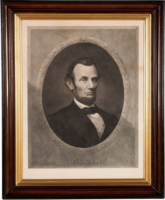
On Nov. 19, 1863, at the dedication of the military cemetery at Gettysburg, Pennsylvania, President Abraham Lincoln spoke these words:
Four score and seven years ago our fathers brought forth on this continent, a new nation, conceived in Liberty, and dedicated to the proposition that all men are created equal.
Now we are engaged in a great civil war, testing whether that nation, or any nation so conceived and so dedicated, can long endure. We are met on a great battle-field of that war. We have come to dedicate a portion of that field, as a final resting place for those who here gave their lives that that nation might live. It is altogether fitting and proper that we should do this.
But, in a larger sense, we can not dedicate — we can not consecrate — we can not hallow — this ground. The brave men, living and dead, who struggled here, have consecrated it, far above our poor power to add or detract. The world will little note, nor long remember what we say here, but it can never forget what they did here. It is for us the living, rather, to be dedicated here to the unfinished work which they who fought here have thus far so nobly advanced. It is rather for us to be here dedicated to the great task remaining before us — that from these honored dead we take increased devotion to that cause for which they gave the last full measure of devotion — that we here highly resolve that these dead shall not have died in vain — that this nation, under God, shall have a new birth of freedom — and that government of the people, by the people, for the people, shall not perish from the earth.
It’s curious that he took the phrase “that all men are created equal” from the second paragraph of the Declaration of Independence, but stopped there rather than continue with the words, “Governments are instituted among Men, deriving their just powers from the consent of the governed — That whenever any Form of Government becomes destructive of those ends, it is the Right of the People to alter or abolish it and institute a new Government.”
The Civil War was NOT fought to create “a new birth of freedom,” as Lincoln suggested. Nor did it create a “government of the people, by the people and for the people.” It did quite the opposite.
As H.L. Menken later wrote about the Gettysburg Address in “Smart Set” in 1920:
[I]t is poetry, not logic; beauty, not sense. Think of the argument in it. Put it into the cold words of everyday. The doctrine is simply this: that the Union soldiers who died at Gettysburg sacrificed their lives to the cause of self-determination — “that government of the people, by the people, for the people,” should not perish from the earth. It is difficult to imagine anything more untrue. The Union soldiers in that battle actually fought against self-determination; it was the Confederates who fought for the right of their people to govern themselves. What was the practical effect of the battle of Gettysburg? What else than the destruction of the old sovereignty of the States, i.e., of the people of the States? The Confederates went into battle free; they came out with their freedom subject to the supervision and veto of the rest of the country — and for nearly twenty years that veto was so effective that they enjoyed scarcely more liberty, in the political sense, than so many convicts in the penitentiary.
The states that left the Union to join the Confederacy did so in the true sense of the Jeffersonian principle of self-government, as stated in the Declaration. Lincoln’s invasion of the Confederate States stood that idea on its head.
The threat of secession was a check on federal power that both New England and Southern states invoked between the ratification of the Constitution and beginning of the Civil War. It was generally understood that, because the Constitution was silent on the issue, secession was a viable alternative to checking federal power. In fact, when during the Constitutional Convention a proposal was made to allow the federal government to suppress a seceding state, James Madison proclaimed: “A Union of the States containing such an ingredient seemed to provide for its own destruction. The use of force against a State, would look more like a declaration of war, than an infliction of punishment, and would be considered by the party attacked as a dissolution of all previous compacts by which it might be bound.” The proposal was removed.
Lincoln’s claims in his address “that government of the people, by the people, for the people ” would somehow “perish from the earth” if the Union lost the war was hogwash. Representative democracy would have continued in the Union and in the Confederacy regardless of the outcome. And remember, neither side entered the war over the issue of slavery. Lincoln’s stated purpose for invading the Confederacy was “preserving the Union.”
Finally, the final outcome of the Civil War did NOT usher in “a new birth of freedom.” It did quite the opposite. It consolidated federal power, neutered the 9th and 10th Amendments and gave birth to the fascist system and the imperial presidency under which we now suffer.
Written by Bob Livingston for Personal Liberty – November 20, 2014

 FAIR USE NOTICE:
FAIR USE NOTICE: